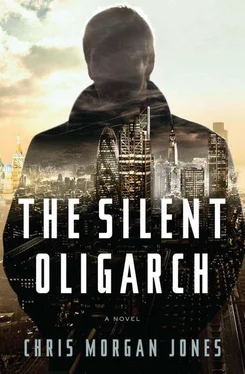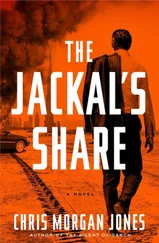“Shall we?”
Lock hesitated for a moment. “Yes, of course.” Fuck. How could he have been so stupid? Fuck. Would Alexei remember how many phones he usually had? If he took two out, and Alexei commented, then he could produce the other one and claim absentmindedness. It was the best he could do. He removed his BlackBerry and a regular phone, took their batteries out and left them on the desk. He smiled again. “So? Where do you want to start?”
Chekhanov was still checking his e-mail. He glanced at his desk and then looked back at Lock, his eyebrows raised. His eyes were gray and quick. “You ready?”
“Yes.” Lock waited for the question. It didn’t come.
“Let us start with Kazakhstan. It isn’t making us any money and the manager’s defrauding us. I think I found a purchaser last week. If we sell it there will be about a hundred and eighty million coming in. Be ready to put it somewhere.”
Chekhanov talked and Lock took sketchy notes. The refinery in Romania was close to breaching its debt covenants and needed money; there were bribes to be paid in Bulgaria, decent ones, if they were going to buy this refinery in Burgas; the group’s financing company needed funds to buy equipment before leasing it on into Russia. And on and on. All the while Lock could feel the phone in his trouser pocket pressing against the top of his thigh.
He looked at his watch. It was 6:35. Surely Alexei had to leave soon? He was talking about some problem with Langland, some customer who hadn’t paid, and checking his e-mail for the details.
“This is no good. I have to go. This one can wait.” He looked up at Lock. “Did you get all that?”
“Yes. I think so.”
“Good. Let’s go.”
Chekhanov put his phones back together and stood up, dropping them in his briefcase. Lock stood too and put the batteries back in his dismantled phones. He put one in his trouser pocket and as he did so keyed in the sequence on the other: down down right down center. As Chekhanov bent over his desk to shut down his computer, the phone rang. Lock took it out, looked at it, pressed a key as if to answer it and then covered the microphone.
“Sorry,” he said to Chekhanov in a half whisper. “Do you mind?”
Chekhanov, gathering up papers now, waved him on.
“Philip, hi. How are you?” Lock answered in English, then paused. “Sorry, I’ve been in a meeting. Yes, I can. Shit, really? That’s not good. Well, I have to leave for another meeting shortly but yes, I’ve got twenty minutes or so. Hold on.” Another short pause. “Hold on a second.” He covered the phone again. Chekhanov was ready to go, briefcase in hand, a quilted coat over his arm. “Alexei, do you mind if I finish this call? It’s important.”
Chekhanov looked at Lock. He seemed to have hardened somehow in the last minute. “Come with me. I’ll drive you to the ministry. Finish your call on the way.”
“It could go on a bit,” said Lock. “I don’t want to bore you.”
“No.” Chekhanov was firm now. “Come with me in the car. Otherwise call this person back.”
“Well, I don’t need to be in the ministry for… Yes, OK. Yes. I’ll come with you.” Lock felt himself flush around his neck. Chekhanov had been briefed about him. He was no longer trusted. “Right, Philip. Sorry about that. How can I help?” This is ridiculous, he thought, as he went down the stairs after Chekhanov, saying the occasional yes or no to keep the fiction up. Chekhanov left the building and walked to his car, which was directly outside. Lock followed, wondering how on earth he was going to finish this. “Quite. Hm. OK, I see.” He got into the backseat, next to Chekhanov, and shut the door. It was suddenly so quiet that his phone felt glaringly dead and silent in his hand. “Philip, listen. I don’t think that sounds so bad. I think the thing to do is to talk to the accountants this afternoon and see if they can do a full, do a full audit on everything. Do you have a sense of how much we’re talking about? Hm. OK. That could be worse.” He gave a sigh in the hope that it would seem authentic. “Listen, let’s talk tomorrow when you know more. Yes. Yes. OK then. Bye. Good-bye.” He sat back in his seat and let the phone fall by his side.
Chekhanov looked down at the phone and then at Lock. “Everything all right?”
“Yes, fine. Fine.”
“What was that?”
“Oh nothing. Some money gone missing in the BVI. Probably an oversight.”
“Not such a long call.”
“No, it was nothing really. In the end. Nothing.”
FOR A WEEK London had been dark and cold. A fine, dense rain fell like sea mist and the city felt empty, like a resort town off-season; as he walked to the Tube in the mornings Webster half expected to turn a corner and find the wind blowing at him on a broad promenade beaten by waves. From time to time the sky lightened from lead to limestone and his spirit dared to lift a little, but this was an oppressive time.
London had felt like this when he moved back from Moscow; an unfamiliar, insidious cold across the shoulders, endless rain that had left him yearning for snow. In those first weeks home he had found his home city more impenetrable than the one he had left behind, and for a while he had regretted trading Moscow’s movement and wild spontaneity for all this admirable solidness. Even now, sometimes, he felt a pang of regret at having left Russia, a sort of homesickness that he could never quite explain. But more than anything this weather brought to mind his long-dead plans—undoubtedly good, never robust—to stop writing stories that never seemed to have any effect, to get out of journalism altogether and do some good; reminded him too of the day he got the call from Global Investigations Corporation and signed up instead for this strange career that ever since he had relished and distrusted in equal measure.
What good did he do? What was his tally? Webster was by instinct an agnostic, but he couldn’t rid himself of the idea that somewhere one’s deeds were being reckoned and that his own score was in the balance. GIC had been convinced of its own worthiness; Ike was more circumspect but believed ultimately that Ikertu was a positive force in the world. Webster even now simply wasn’t sure. What did he accomplish, exactly? How was the world different for what he did? He helped his clients not to lose money or reputation. That was all. If his client was upright, he told himself, this was good work, if hardly saintly; when, as now, his client was at best a rogue, how did he help anyone at all?
Snowdrop was unsettling him. It was the case he had always wanted, his chance finally to afflict those who tended to do the afflicting. But Elsa’s words wouldn’t leave him. This had become a quest—a twin quest, Tourna’s and his own—and his sense of proportion was unbalanced. He was no longer sure why he was pursuing Malin. Was it to restore to Tourna what was rightfully his? To show the corruption that still ravaged Russia, and by doing so accelerate its end? Or simply to destroy a life in compensation for the life he had seen destroyed?
Hammer’s advice, as ever, was simple and good. Do what it says on the engagement letter; remember the commitment you made. And while Webster’s motive might have troubled him, at least his next step was clear.
He had to get a message to Lock, and in such a way that no one else would know of it. The message itself was simple: you have options; do not assume that there isn’t a way out of this; you will need expert help, and I am the expert. Webster had taken down and folded away the hand-drawn map of Malin’s world that he had stared at for so long, and in its place was now a single sheet of poster-sized paper. On it was a circle drawn in thick black ink, and inside the word “Lock.” One other smaller circle marked “Onder” sat to one side. That was as far as he had gotten.
Читать дальше












